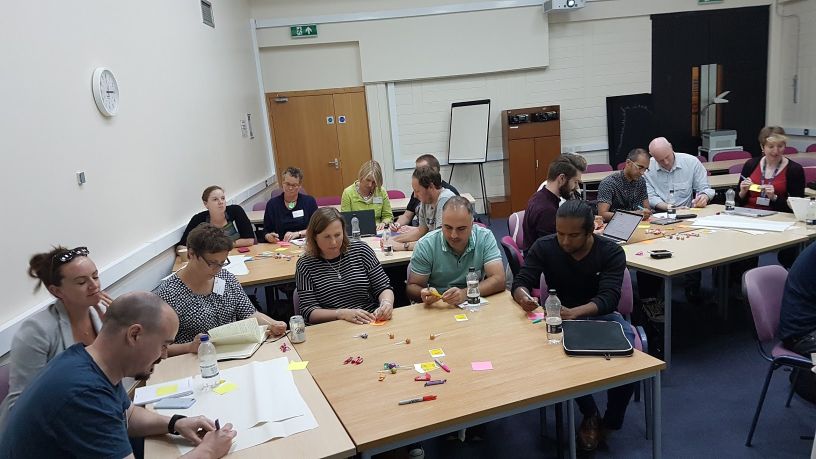Background
The call for submissions for IWMW 2018 has been extended by two weeks, to 26 February. This post provides details of the second phase of the call for submissions.
The IWMW 2018 event will take place at the University of York on 11-13 July 2018. The event, which celebrates its 22nd anniversary this year, provides an opportunity for members of institutional web and digital teams to share their experiences (and frustrations!), learn from peers across the UK’s higher education sector and also hear about approaches from outside the sector.
The theme for IWMW 2018 — Streamlining Digital — was announced on 3 December and the call for submissions was launched on 18 December with an initial closing date of Monday 12 January. We have received an excellent range of submissions, and it looks as though most of the plenary talk slots will be filled (we need to review the submissions in more detail before we can confirm the talks but at first glance they all appear to be relevant and we wish to give priority to those who submitted proposals before the official closing date).
Submissions to IWMW 2018: Phase 1
The Advisory Group agreed this year to have a two-stage submission period: after the first closing date we would review the proposals in order to identify gaps in the content, potential enhancements to the structure of the event and ensuring that we had a diverse range of speakers and facilitators: not only do we want to avoid organising an event with an overwhelmingly large proportion of male speakers, we also aim to ensure that we have speakers from across the higher education community and that we continue to attract new speakers.
We were therefore pleased that the first four submissions came from female speakers. We have also received two submissions from new attendees at IWMW events as well as a handful from attendees at recent IWMW events who have not spoken at the event previously.
We have also received submissions from the London, North East, North West, South East and Scotland – but none (yet!) from the Midlands, the South West, Wales or Northern Ireland. We hope these gaps will be filled in the second phase of the submission process, which is described below.
Ensuring Diversity; Providing Flexibility: Phase 2
The second phase of the submission process is now open. The aim is to provide an additional opportunity for submissions, especially submissions which ensure diversity across the range of speakers and also in the approaches taken to delivering content at the IWMW 2018 event.
In a recent post Claire Gibbons, IWMW 2018 co-chair, summarised “The Different Types of IWMW Event Sessions“. The slots available for plenary talks are probably all taken, but there are still opportunity to propose workshop sessions and masterclasses. In addition we’d particularly welcome submissions which propose different ways of providing content: as described in the post in the past we have organised debates and panel sessions and it may be timely to rerun such approaches. But in addition there may be new approaches which could be taken: lightning talks, perhaps, or even a ‘hack-a-thon’.
Note also, that although we welcome submissions which address our diversity challenges, all submissions will be welcomed!
Addressing The Gaps: Phase 2
As well as providing opportunities to provide a diverse set of speakers and a more diverse programme, the second phase for the submissions provides an opportunity to solicit submissions for areas which have not yet been covered.
In order to identify ‘hot topics’ for web managers members of the IWMW 2018 Advisory Group recently took part in an exercise in which they were asked to summarise topics they would like to see addressed at the event and also (the ‘Pointless’ exercise, for those who are familiar with the BBC quiz programme), topics in niche or specialist areas which may only be of relevance to small numbers within the sector: such topics (e.g. managing Welsh language websites) would probably not be given in a plenary talk but could be a valuable workshop session, if we felt they would attract over half-a-dozen participants (if there were fewer numbers we could perhaps suggest an informal birds-of-a-feather session).
As might be expected many of the ‘hot topics’ have been addressed in the submissions we have received. A summary of topics which may not have been addressed is given in Appendix 1 below. In brief these topics mostly fall into the following areas:
- Statutory compliance: Especially GDPR (although as this will need to be addressed after it comes into law, it may be looking back at how it was addressed). But also other compliance areas, such as CMA, accessibility legislation, etc.
- CRM and Personalisation: Case studies of how institutions have addressed this would be welcomed.
- Governance issues.
- Ensuring effective and productive digital teams: Covering personal effectiveness; career development; staff moral; managing stress; team working and effective leadership.
- Supporting international markets.
- Analytics and Data Visualisation.
- Providing a consistent UX in a devolved and distributed environment.
- Emerging technologies including AR; chatbots and virtual reality.
- Managing the graceful shutdown of digital services.
- Possibly legacy technologies: is XCRi still relevant, for example.
Note that although submissions which address these issues are welcomed, please do not feel constrained by the topics listed above!
Appendix 1: Details of the Hot Topics Suggested by the IWMW 2018 Advisory Group
Members of the IWMW 2018 Advisory Group were asked to summarise topics of interest which they would like to see addressed at the IWMW 2018 event. A partial summary of the responses is given below.
- CRM: Who is rising to the challenge of CRM and what are they doing? How are they ensuring ‘Omni-channel’ responsiveness? How does CRM impact on/integrate with Web/CMS/Content strategy?
- GDR: What are institutions doing? Where is it hitting hardest and what are the implications? Does every cloud have a silver lining (e.g. rationalisation of CRM). Or perhaps, looking back at how we coped.
- Personalisation for real: A case study of somewhere that has done this ‘properly’.
- Statutory Compliance: The growing role of statutory compliance and how we’re responding to it (GDPR, but before that and still ongoing CMA, ASA, …).
- Enquiry management: For student recruitment but also other queries – this obviously relates to CRM.
- Enterprise Architecture vs Digital: Can it be done or are we “always holding things together with bits of string?”
- Process improvement: For example Lean / business analysis / digital – case studies and examples.
- Internationalisation: Providing 24/365 institution/online learning/marketing across different cultures.
- Digital for international markets: A case study of somewhere that had really gone after overseas markets and what they’d done would be interesting.
- Analytics for sharing and integration: For example ’how to make the most of Google Data Studio.
- Content Teams and Editors: Devolved versus centralised approaches, and the important role of the Content Editor (as in the traditional sense of the Editor word) to oversee everything in terms of UX, consistency, compliance, accessibility, etc.
- Developing UX across siloed teams: Organisations seeing the user journey from start to finish can be difficult when different stages of the journey sit with different departments (this could be a physical journey as well as a digital one).
- How do ‘young people’ use the web: And asking the question “Are they using our institutional websites at all?”
- Chat and bots: The pros and cons of delivering services live versus using a ‘robot’.
- AI: How AI will start to affect how people want to interact with our organisations, e.g. voice control.
- Virtual reality and student recruitment: Virtual tours – do they work? Are they worth the cost? What technology are people using?
- XCRi: Is it dead or do we still need a standard for course information?
- Being seen as professional: Web and digital teams being given the responsibility and authority they need to do what is best for the institution, rather than being railroaded by senior colleagues who don’t know what they are talking about
- Governance: Governance and having the authority to carry out policies and procedures etc.
- Investment in web and digital: Recognising that such investment is seen as a cost, but a valuable one, to the institution.
- How to Keep Going: how to retain enthusiasm and professionalism.
- How to get things done ‘between the lines’: What do you do if you can’t transform (as an organisation). Perhaps pros and cons of ‘skunkworks’.
- How to manage a team: Management skills for members of web teams.
- Trusting web professionals: How to persuade management that web/digital is a long term investment.
- Training and development: Teams being given the opportunity to take time out and learn more (either through formal events or informal team activities – seems to be still seen that the Web Team have to be there all the time ‘just in case’ yet are probably the most mobile and connected team of them all”.
- Communications for Digital Teams: Blogging / newsletters / meetings / conferences – how do we communicate digital best practices to colleagues?
- Digital, who exactly owns it?: Digital Transformation, Digital Literacy, Digital Scholarship, Digital Communications. Are we living in a post-digital age and who exactly “owns” digital, or do we just accept that no one area can “own” it anymore?
- The web professional’s career: As there are expected to be many newbies at IWMW events this session could explore how ones’ career may develop, and how the community could ensure that individuals careers (and possibly post-professional career) develops effectively.
- Women working in digital in Higher Education: For a long time ‘web’ was seen as a male-dominated field but teams now seem to be more balanced. What are the struggles that women working in digital / web in HE experience, and how can we alleviate these?
- Handling stress: How can web professionals address the stress levels associated with providing large scale digital services, at a challenging time for the sector.
- Being productive: So much work to do; so many stakeholders; so much new things to learn about!. How do we manage our time effectively?
- Web preservation: The pressure is to develop new web sites asap, but what about the preservation of digital stuff for the past? What should be done?
- Why does no-one use illustration on University websites?: It would be useful to have examples of the benefits of illustrations (e.g. from non-HE sites) and maybe example from HE web sites which challenges the assumption!


